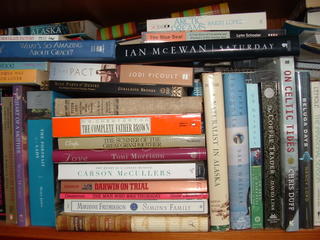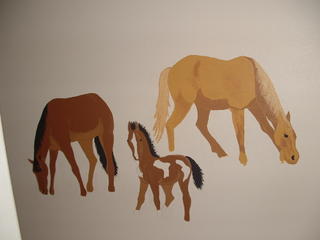Can I Fix It? Yes I Can!
 In the course of inevitable conversations about the catastrophic aftermath of Hurricane Katrina, discussion often turns towards the ten-thousands of people who foolishly chose to stay in New Orleans, despite repeated grave warnings, and a mandatory evacuation. Why would anyone stay?
In the course of inevitable conversations about the catastrophic aftermath of Hurricane Katrina, discussion often turns towards the ten-thousands of people who foolishly chose to stay in New Orleans, despite repeated grave warnings, and a mandatory evacuation. Why would anyone stay?Depending on who I spoke with, multiple reasons were suggested:
- Some cited poverty – a willingness to leave but a decided lack of financial resources to do so.
- Some suggested a lack of information, and perhaps the lack of an educated, historical context for processing what information was received. (Anyone who’s ever read Erik Larson’s “Isaac’s Storm,” about a massive hurricane that struck Galveston, TX – as Bruce and I had – would have hit the high road immediately.)
- There were surely the contingent who asked themselves, “How bad can it be?”
- And the others who thought, “Well, we made it through Camille okay...”
- And also, “These things are never as bad as they predict.”
- There is also stubbornness, plain and simple, like old-timer Harry Truman who refused to leave Mt. St. Helens even when faced with the massive 1980 eruption that killed him and 56 others.
Certainly it was different for every person. We’ll never know all the reasons, though we can learn from their collective experience – better safe than sorry, especially for those of us who have children depending on our every decision. (I still cringe at a pre-storm interview I saw with the mother of a two-year-old girl who said they and her husband would be “riding it out” in their boat in the harbor.)
One particular conversation I had with a friend here in Anchorage gave me a bigger picture analogy to work with (I’m all about the “bigger picture.”) It wasn’t so much what was said, but who was saying it. The person to whom I was talking is not without personal weakness and fault. At the risk of revealing too many personal details, suffice it to say a great deal of brokenness and hurt are a part of this person’s psyche. This brokenness intrudes more and more into daily life, and, as it goes unaddressed, more and more loved-ones are being affected by it.
Many people in the southern coastal areas hardest hit by Katrina erroneously believed that they could “ride it out,” simply by mustering up the courage to do so, and perhaps because they had weathered difficult storms before. Despite all the technology we have to tell us when and with what force the storm would hit, people ignored the municipality’s pleas to flee from the danger, seek help and shelter elsewhere, refusing to acknowledge that some things in life are just too big for even the cleverest and strongest of humans to manage.
In the same way, my friend erroneously believes that internal wounds can be self-healed with enough determination and willfulness. I wish I had had the presence of mind to allegorize the hurricane victims during our discussion. Perhaps then a seed of something would be planted, perhaps positively guiding this person to seek help in sorting through the onion-layers of lifelong hurt.
Sometimes it is only through analogy and allegory that we ever truly see our lives clearly, but, even then, only because we choose to do so. Saying something at that moment might have done nothing at all.
I don’t think my friend is alone in wading through life wounded. Nor unique, is the idea that we can fix ourselves alone if we just persist, persist, persist. I think sometimes the wounds in our lives go too deep, and are just too jumbled together to be made sense of alone. Sometimes it isn’t even wounds, but an innate stubbornness and pride that cause us to want to trudge through life single-handedly, doing it ourselves. As a consequence, we can find ourselves emotionally, and often physically, alone.
I guess maybe I shouldn’t generalize so much. Not every person is determined to fly solo, but I certainly do, and with the self-isolating behavior I described in my earlier essay, “Puzzling Through Life,” I tend to try and fix myself, talk myself through things. I am ashamed to admit my weaknesses and brokenness.
When I was a much younger person, and I was still trying to figure out a successful way of communicating with the rest of the species, I, for a time, attempted to make contact by using a “wounded-heart” method. I thought if I appeared helpless and troubled, people would flock to my side, asking what was wrong, where did it hurt, and that by pouring my woes on others, intimacy would result. What I discovered was that this method works, but only in drawing a certain sort of person – the sort who is also hurting and helpless.
My friends and I would take turns wallowing in self-pity, and for awhile this was great, but as I got older I realized that all of us crying-out types were really crying-wolves, with the real issues completely overlooked. So consumed were we with self-centeredness that we were incapable of not only helping ourselves or each other, but incapable of truly having balanced and healthy give-and-take relationships with anyone.
As I matured, I gave up this method of friendship-making, but again found myself back at square one. How to engage in healthy relationships? Well, first of all, I needed to identify emotionally healthy individuals. Once identified, I had to tread carefully, sure not to scare anyone away by revealing any lack of emotional health on my part. When I discovered this method worked much better, and attracted some of the dearest people I’ve ever known, I patted myself on the back and did my best to bury my ugliest flaws from them. So now I’m at the other end of spectrum, still trying to figure out how to balance it all out.
I am at a place in my life where I recognize there are old wounds, but am not convinced they are bad enough to do anything about, other than privately acknowledge them. (There's a difference from a scar and a wound that is still oozing.) I’ll take my wounds out of their box every once in awhile, and sift through them, macabre mementos from the past, remembering them, sighing over them, trying to understand how they still affect me today, then put them back in the box which is safely kept under lock and key.
Because I do not see these skeletons intruding (at least not much) into my daily life, I mostly leave them alone. If my marriage was threatened, or my parenting skills compromised, then it would be clear the damage needed a serious repair job. Even though I don’t bring my brokenness to an institutional setting, I do use my faith as a tool to lube, oil and otherwise maintain my Self. I genuinely believe that in my particular case, this is enough. And why absorb resources from others who are more desperate than I?
What, then, about people, like my hurting friend, who do not have faith, or doctors and counselors, or friends they trust, to help? I think then, if the wounds are deep enough, it is like the breaching levees in New Orleans, the trickle becomes a flood, and the flood scours deeper and deeper into the ground, saturating and tainting everything. And there is the potential for the flood to be as “seemingly impossible” (to quote the governor of Louisiana) a situation to fix as there ever could be.
Louisiana, Mississippi and Alabama are not going to be able to repair themselves alone. It will take the effort and cooperation of millions of people in an unprecedented endeavor, to repair the levees, to the pump out all that filthy water, clean up the mess and finally, begin to rebuild. In order to rebuild, certain steps must be taken. It is a painful and difficult process; it can take a long, long time; and a great deal of resources. Such a job cannot be done alone.
The bottom line: it's hard for me to be too critical of the citizens of New Orleans who stayed. In my own way, in other less tangible realms of life, the same inner engine is similarly churning.


 Recognize the name Timothy Treadwell? His name is fairly common these days. He is the subject of a limited-release documentary film titled “The Grizzly Man,” by German director Werner Herzog. It’s a morbidly fascinating tale about a man who spends thirteen summers in the Katmai National Wildlife Reserve in Alaska before he is eaten by an anomalously predatory bear.
Recognize the name Timothy Treadwell? His name is fairly common these days. He is the subject of a limited-release documentary film titled “The Grizzly Man,” by German director Werner Herzog. It’s a morbidly fascinating tale about a man who spends thirteen summers in the Katmai National Wildlife Reserve in Alaska before he is eaten by an anomalously predatory bear.











